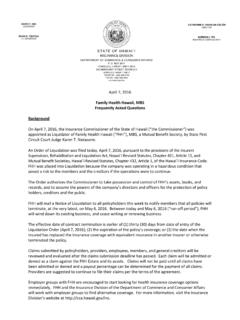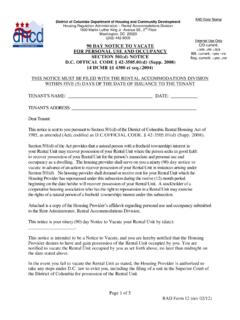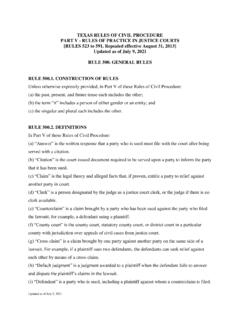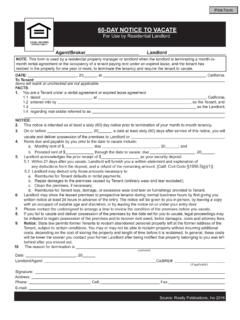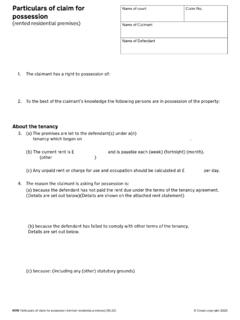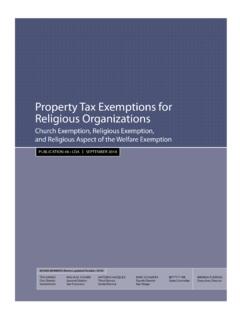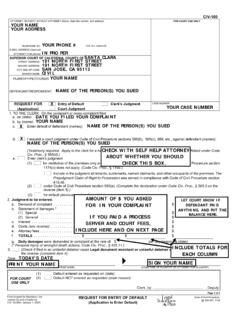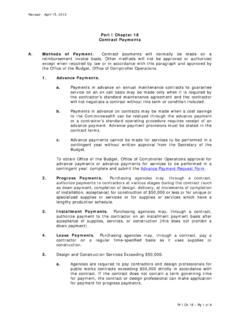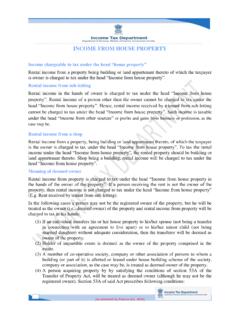Transcription of Landlord Tenant Handbook - Hawaii
1 INTRODUCTION. This Handbook for the Hawaii Residential Landlord - Tenant Code is published by the Office of Consumer Protection, a division of the State Department of Commerce and Consumer Affairs. It is designed to be a useful guide for all Hawaii residents and attempts to address the questions and concerns most frequently expressed by landlords and tenants. THIS Handbook HIGHLIGHTS AREAS OF THE Landlord - Tenant CODE. IT. DOES NOT DUPLICATE OR EXPLAIN THE COMPLETE TEXT OF THE CODE. PERSONS DESIRING TO REVIEW THE COMPLETE TEXT OF THE Hawaii . RESIDENTIAL Landlord - Tenant CODE SHOULD OBTAIN A COPY OF. CHAPTER 521, Hawaii REVISED STATUTES.
2 The Hawaii Residential Landlord - Tenant Code is the name of Chapter 521, of the Hawaii Revised Statutes (HRS). The section numbers that are cited throughout this Handbook refer to the sections of Chapter 521. This Handbook is for informational and reference purposes only, and does not provide legal advice. The information in this Handbook is subject to change. The organization of this Handbook is based upon the same general categories that appear in the Code. The reader may note that the recurrent intent of the Code is equal justice for both landlords and tenants. Much of the confusion and difficulty so common in Landlord - Tenant disputes would be minimized or eliminated if there were better understanding and communication between landlords and tenants.
3 One way of achieving this is through the use of clearly written agreements and understandings and insuring that the agreements are signed by the Landlord and the Tenant in duplicate with copies provided to each. Such points of agreement that are not clearly understood should be discussed, clarified and put into writing. If you have questions on a Landlord - Tenant matter, call the Office of Consumer Protection 586-2634 or consult an attorney. For the neighbor islands, please refer to the phone numbers on the front cover. THIS MATERIAL CAN BE MADE AVAILABLE FOR INDIVIDUALS WITH SPECIAL. NEEDS IN BRAILLE, LARGE PRINT OR AUDIO TAPE.
4 PLEASE SUBMIT YOUR. REQUEST TO THE OFFICE OF CONSUMER PROTECTION DIVISION SECRETARY. AT (808) 586-2636. TABLE OF CONTENTS. INTRODUCTION. RENTAL 4. Types of 4. Contract 4. Term of Rental 4. Rent .. 5. 5. Advantages and Disadvantages Of Different Types of Rental 5. Limitations on Rental Agreements and Practices .. 5. Legal 5. SECURITY DEPOSITS .. 6. Lawful Use of Deposits .. 6. Amount of Deposit .. 6. Retention of Deposit .. 6. Limitation Period to Recover 7. When Dwelling is Sold .. 7. Security Deposit 7. 7. Emergency Repairs .. 7. Repairs to Correct Conditions Affecting Health and Safety .. 8. Other Repairs.
5 9. Schedule of Deadlines for Repairs .. 9. PROHIBITED 10. Lockouts .. 10. Retaliatory Evictions and Rent Increases .. 10. Turning Off Utilities .. 11. TERMINATION OF TENANCY .. 12. Month-to-Month 12. Week-to-Week Tenancy .. 12. Fixed Term Rentals .. 13. Holdover .. 13. Landlord 13. Conditions a Tenant May Expect From 13. Rental Agreement; Disclosure .. 14. Access .. 15. Tenant OBLIGATIONS .. 15. Tenant Maintenance .. 15. Compliance With Rules .. 15. Obligation to Pay Rental .. 16. Tenant 's Absence Without 16. Access .. 16. Tenant Absence and Repair 16. Inform Landlord of Repair 16. Landlord 17. Failure to Pay Rent.
6 17. Court Action for Rent Payment .. 17. Rent Trust 17. Tenant Negligence, Failure to Maintain, or Unlawful Use .. 17. 18. Misuse .. 18. Abandonment .. 18. Tenant Quits Before 18. Landlord 's Remedies for Improper Use .. 19. Tenant 's Refusal to Allow Reasonable 19. Entry in Case of Emergencies .. 19. Tenant REMEDIES .. 21. Tenant Unable to Gain Possession .. 21. Termination During First Week of Occupancy .. 21. Termination at Any 21. Unlawful Removal or Exclusion .. 21. Retaliatory Evictions and Rent Increases Prohibited .. 22. Non-Disclosure .. 22. Landlord 's Entry Without Permission .. 22. Unreasonable Entry.
7 22. Fire or Casualty 22. Tenant 's Remedy for Repair .. 22. QUESTIONS & 25. 25. 25. Rent .. 26. Abandoned Possessions .. 27. Discrimination in Real Property Transactions .. 27. HAWAI. I'. SLANDLORD/. Tenant CODE 28. 4. RENTAL AGREEMENTS. Types of Agreements. Rental agreements between landlords and tenants are legal in both written and oral forms. A. Written Agreements. A written agreement may be for any length of time: month-to-month, six-months, one-year or any other term. All promises and house rules should be written into the agreement. Anytime the Landlord and Tenant make any new agreements or changes to the existing agreement, the new information should be put into writing and signed by both parties.
8 B. Oral Agreements. An oral agreement normally creates a month-to-month tenancy. An oral agreement for a fixed term may not exceed one year in duration. While oral agreements are more easily reached, exact promises and details should not be neglected. Problems often arise when promises are made, but are not clearly spelled out. For example, if the Tenant is responsible for yard work, such terms as the following should be clarified and agreed upon: Is watering the lawn once a week sufficient? Is the Tenant required to trim the hedges? Who will provide the tools? Contract Provisions. The Landlord and Tenant should agree on the following: A.
9 The amount of rent; how, where and by when the rent is to be paid, and the penalty for late rent or returned checks. B. Any exchange of services which affects the amount of rent, except employment as unit manager or maintenance personnel. (Example: yard work for reduced rent). C. The term of the rental (weekly, monthly, or lease). D. If the Landlord 's consent is required for the Tenant to sublet the Tenant 's dwelling unit or to assign the rental agreement to another. E. Any special provisions for individual tenants. Term of Rental Agreements - Section 22. The Landlord and Tenant may agree in writing to any time period as the term of the rental agreement.
10 In the absence of such agreement, the tenancy shall be month to month or, in the case of boarders, week to week. Rental Agreements 5. Rent - Section 21. Rent is usually paid on either a monthly or weekly basis. Normally, rent is paid on a monthly basis in a month-to-month tenancy and on a weekly basis in a week-to-week tenancy. A. In a month-to-month tenancy, rent may be increased by the Landlord if written notice is given to the Tenant at least 45 consecutive days before the effective date of the increase. B. For tenancies which are less than month-to-month a written notice must be given to the Tenant at least 15 consecutive days prior to increasing rent.
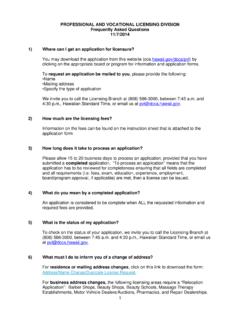
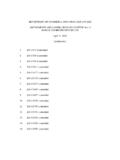


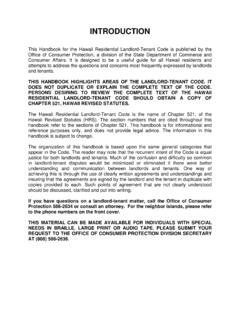
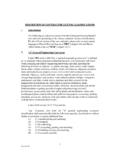
![CHAPTER 329 [NEW] UNIFORM CONTROLLED …](/cache/preview/7/b/4/1/8/2/d/e/thumb-7b4182de407585aa85cfb3800e495276.jpg)


